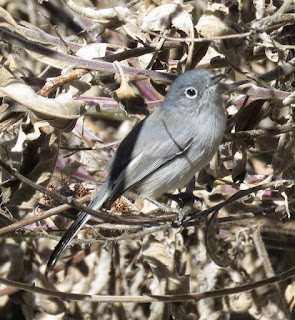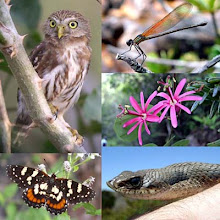In
preparation for the Tucson Valley Christmas Bird Count on December 14 (for
which I’m the primary compiler), this past Saturday I made a workout of biking
to and hiking Pima Canyon, in the foothills just a few miles north of where I
live. I’m planning on doing the Finger Rock Canyon trail to Mt. Kimball and
back, which is the distance and elevational change equivalent of hiking into
the bottom of the Grand Canyon and back. One should be fit, and that I am not.
That day was
the day of Tucson’s largest annual biking event, El Tour de Tucson, and as I
biked up First Ave and approached Ina Road, part of the race’s route, I came
across this incredibly stupidly placed sign alerting northbound drivers to
expect exceptional bike traffic ahead. It’s impossible for me to put myself in
head of the county worker who placed this sign, completely blocking the bike
path for any cyclists not part of the race. Could he have not been aware that
was a bike lane? Or unaware that people bike in Tucson other than on that
single day? I’m convinced that headlines such as “Tucson region receives 'Gold
Award' as bicycle friendly community” are completely spurious political favors
and have no basis in reality. But don’t get me started. Yes, I moved the sign, after the city police prepared to direct traffic at the intersection ahead shrugged their shoulders and said "not my problem – that's a county road." If was mad to begin with, I became furious.
It was
indeed a good workout, and I pumped the frustration out of my circulation, biking almost entirely uphill all the way, followed by a
rigorous hike of 1 ¼ miles through hilly desert before I reached birdable
riparian habitat. Here’s a view of the most lush section of canyon bottom with
two kinds of willow and Fremont Cottonwood, among a huge diversity of shrubs
and vines.
This is
where I located this Bell's Vireo, almost certainly the same bird that Paul
Suchanek had in this area the past two winters. Though he only had it while
scouting before the Christmas Bird Count last year, we had bad weather on the CBC
day, making finding birds difficult. When he found it on the CBC two years ago,
it was the first in the Tucson Valley CBC’s 44-year history. I think there are
only a couple other winter records for elsewhere in SE Arizona. This bird lacks
the bright yellow flanks and greener back of the eastern subspecies, so I’d
guess that it comes from the northern edge of the SW subspecies’ breeding range
in Utah or Nevada and anomalously migrates just this far.
I pished and
tooted up a few mixed flock of residents and winter birds. The Black-tailed
Gnatcatchers are here year-round and have apparently had very good breeding
success recently – I tallied 16 on my eBird submission.
I had only
about three Rufous-crowned Sparrows, but they are at the lower edge of their
elevational range here (they don’t know the elevation, but their distinctive preferred
habitat of open brushy and rocky slopes with bunch grasses is more continuous higher
up).
A Spotted
Towhee was either a local altitudinal migrant or a medium-distance migrant from
the northern tier of US states or southern Canada; I suspect the latter, but I
don’t think you can tell from the plumage characteristics here.
It’s been
unbelievably warm with no real cold fronts yet this season, so arthropods were
in full abundance. This is Archilestes grandis,
the Great Spreadwing.
The larger
of these two wasps on Coreocarpus
arizonicus, Little Lemonhead is a female in the family Scoliidae and genus Campsomeris. I have no idea about the
other, but it might be a male of the same species.















I'm not sure if this is the best place to leave this message but you were suggested by a friend as someone to ask for advice. Next week (very last minute, I know) I'm going to be in the Burbank area. My friend thought you might be able to suggest a potential guide in the area. Sorry to bother you but hopefully you can offer some advice. The easiest way to reach me is by email at sdjames@on.aibn.com. Thanks in advance!
ReplyDeleteSincerely,
Sean